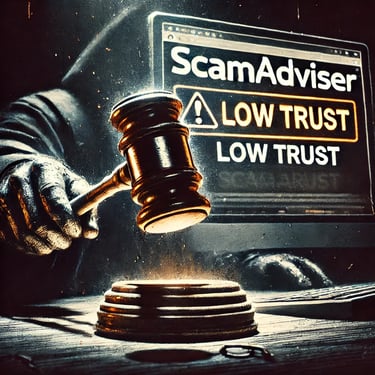Scamadviser Review: Is This Trust Rating Site the Real Scam?
Scamadviser review: Uncover the flaws in Scamadviser’s trust ratings. Learn how its questionable methods impact legitimate businesses and why caution is advised.
As an Amazon Associate, I earn from qualifying purchases. This means I may earn a commission if you click on an affiliate link and make a purchase, at no extra cost to you.
Introduction: Scamadviser – The Internet's Flawed Gatekeeper
Scamadviser.com positions itself as the ultimate authority on website trustworthiness, offering trust scores that can make or break online reputations. However, beneath its façade of consumer protection lies a system riddled with inconsistencies, lack of transparency, and questionable motives that might be harming legitimate businesses more than protecting consumers.
1. The Opaque Algorithm: Trust Scores Without Trust
Scamadviser claims to utilize a sophisticated algorithm to assess website credibility. Yet, the specifics of this algorithm remain undisclosed, leaving website owners and users in the dark about the criteria influencing trust scores. This lack of transparency raises concerns about the reliability of their assessments, leading to potentially arbitrary “low trust” labels slapped onto sites that don’t fit Scamadviser’s mold.
Recommendation: Consumers should cross-reference Scamadviser ratings with other reputable sources and user reviews to form a well-rounded opinion.
2. Collateral Damage: Legitimate Sites Unfairly Penalized
Legitimate businesses often find themselves unfairly labeled as "scams" due to Scamadviser’s flawed evaluation methods. Factors such as new domain registration or limited online presence can result in low trust scores, harming businesses that actually adhere to ethical practices.
Case in Point: Even our own site, which complies with all industry standards, has been assigned a 51% trust score by Scamadviser, adversely affecting our reputation and sales.
Recommendation: Website owners should actively monitor their Scamadviser ratings and seek clarification or correction when discrepancies arise.
3. Questionable Practices: A Foreign Company Profiting Off Fear of “Scams” in American Markets?
Let’s pause to consider the setup. Scamadviser is a Dutch operation, and yet, it has a peculiar knack for targeting American businesses, labeling them “low trust” with questionable accuracy. Now, we’re not saying there’s a targeted mission here, but it’s worth pondering why a foreign entity is so invested in judging American companies. Who benefits from these broad-stroke ratings on U.S.-based businesses? It’s a little rich, don’t you think?
Recommendation: For American consumers and businesses, approach Scamadviser with a healthy dose of skepticism. Their ratings may serve interests far from neutral.
4. The Real Dirt: Profit Motives and User Complaints
Scamadviser, a platform that evaluates website trustworthiness, has faced criticism from various users and businesses. Some legitimate businesses have reported receiving low trust scores, which they believe negatively impact their reputation and sales (Complaints Board). Additionally, there are allegations that Scamadviser’s business model, which includes advertisements and potential partnerships, could influence its trust scores, leading to biased evaluations (MakeUseOf).
While Scamadviser claims to be looking out for the consumer, its money-driven model leaves many wondering whether “impartial” ratings might be swayed by profit. With affiliate links, ads, and even potential partnerships, one has to question who’s really gaining from these ratings.
Recommendation: Keep your radar on. Always follow the money, and don’t assume that a rating driven by profit motives is inherently trustworthy.
Conclusion: Rethinking Scamadviser’s Role in Online Trust
Scamadviser wants us to see them as the internet’s white knight, but a closer look shows a company profiting off of paranoia. Next time you see a “low trust” rating, ask yourself—could the real scam be in the advice itself?
References
Tladi, M. (2024, August 16). Is ScamAdviser Legit? Here's What You Need to Know. MakeUseOf. Retrieved from https://www.makeuseof.com/is-scamadviser-legit-heres-what-you-need-to-know/
Scamadviser Reviews - 320 Reviews of Scamadviser.com. (n.d.). Sitejabber. Retrieved from https://www.sitejabber.com/reviews/scamadviser.com
The Controversy Surrounding ScamAdviser: Insights and Implications. (n.d.). GitHub. Retrieved from https://github.com/orgs/Journal-Technology/discussions/112








